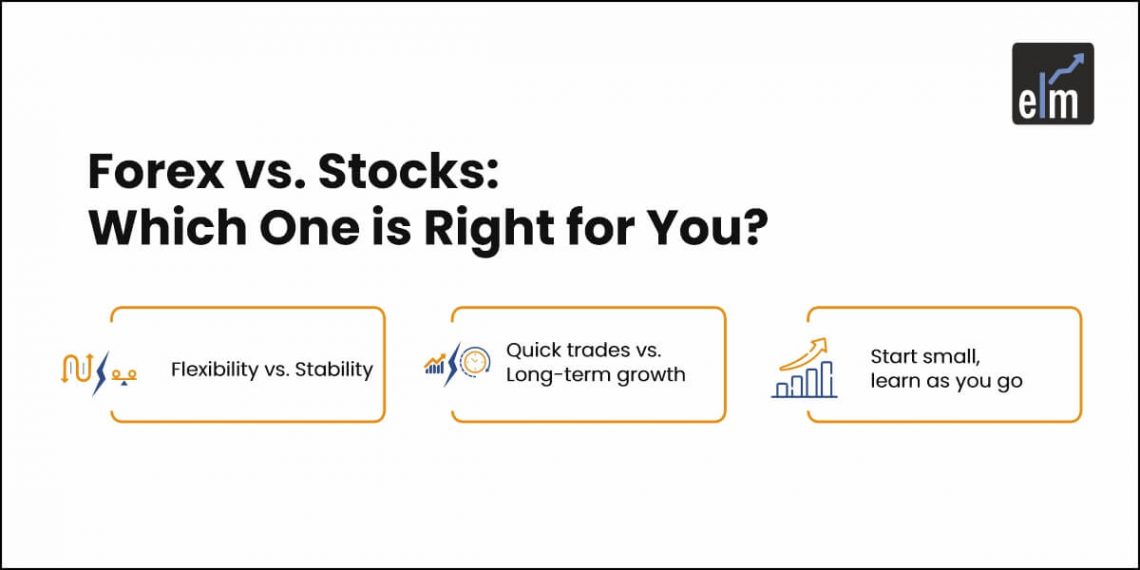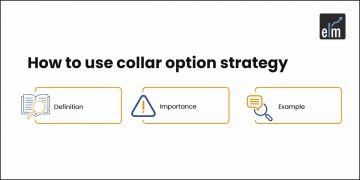Imagine having the power to trade global currencies around the clock or invest in iconic companies like Apple or Tesla. Whether you’re chasing fast-paced market action or building long-term wealth, your first step is choosing between two major trading arenas: the forex market and the stock market.
Both markets are gateways into the financial world, but they operate on very different principles and rhythms. While forex trading offers unmatched liquidity and 24/5 access, stock trading provides ownership in companies and potential dividend income. As a beginner, this decision can shape your trading strategy, risk profile, and even your financial future.
So, which market should you explore first? This guide breaks down the key differences between forex and stocks to help you make a confident, informed choice.
Market Overview
Before diving into the specifics of forex and stock trading, it’s essential to grasp the fundamental structures and functions of these two prominent financial markets.
Forex Market
- Definition: The foreign exchange (forex or FX) market is a global decentralized platform where currencies are traded. It’s recognized as the largest financial market worldwide, with a daily trading volume exceeding $7 trillion.
- Trading Mechanism: Forex trading involves the simultaneous buying of one currency and selling of another, conducted in pairs (e.g., EUR/USD). Traders speculate on the exchange rate between these pairs, aiming to profit from fluctuations in currency values.
- Participants: The market comprises a diverse array of participants, including central banks, financial institutions, corporations, and individual traders.
- Operating Hours: One of the forex market’s distinctive features is its continuous operation, functioning 24 hours a day from Monday to Friday. This schedule accommodates traders across various time zones and allows for trading flexibility.
Stock Market
- Definition: The stock market is a public marketplace where shares of publicly traded companies are bought and sold. Purchasing a stock signifies fractional ownership in a company, entitling the shareholder to a portion of the company’s assets and earnings.
- Trading Mechanism: Investors buy shares with the expectation that the company’s value will appreciate over time, leading to potential capital gains. Additionally, some companies distribute dividends, providing shareholders with a share of the profits.
- Participants: The stock market includes institutional investors, retail investors, mutual funds, and other entities, all engaging in the buying and selling of company shares.
- Operating Hours: Stock markets operate during specific hours corresponding to their respective regional exchanges. For instance, the New York Stock Exchange (NYSE) operates from 9:30 AM to 4:00 PM Eastern Time, while the National Stock Exchange (NSE) in India functions from 9:15 AM to 3:30 PM Indian Standard Time.
Key Differences: Forex vs. Stocks
- Trading Hours: Forex operates 24 hours a day, five days a week, allowing flexibility for global traders. Stocks are tied to specific exchange hours, limiting when you can trade.
- Liquidity: Forex is the world’s most liquid market, especially major currency pairs. Stock liquidity varies—blue-chip stocks are highly liquid, but small-caps may not be.
- Leverage: Forex brokers often offer higher leverage, increasing both profit potential and risk. Stock trading typically involves lower leverage, offering a more conservative risk profile.
- Market Drivers: Forex is driven by macroeconomic indicators, interest rates, and global events. Stock prices are influenced by company performance, earnings reports, and industry news.
- Variety of Instruments: Forex focuses on fewer trading pairs, whereas stock markets offer thousands of individual companies to choose from.
- Costs: Forex trading costs are usually built into the spread, while stock trading may include commissions or wider spreads for less-liquid stocks.
As noted on Rational FX the key is not to choose the “better” market, but rather the one that suits your style. Many beginners benefit from testing both in demo environments to gain clarity before investing real capital.
Which Market Is Better for Beginners?
Choosing between forex and stocks as a beginner depends on your financial goals, risk tolerance, and the time you can commit to learning and trading.
Forex for Beginners
The forex market offers low entry barriers, with many brokers allowing micro-lot trading and minimal capital requirements. The 24-hour access is convenient for those who want to trade outside standard business hours. However, high leverage and fast price movements can be risky for inexperienced traders. Beginners often find the forex market overwhelming due to its reliance on global macroeconomic factors, interest rate decisions, and geopolitical events
Stocks for Beginners
The stock market may be slower-paced and more intuitive for new traders. When you buy a stock, you’re investing in a company, which can be easier to analyze and relate to than abstract currency pairs. Additionally, long-term investors can benefit from dividends and capital appreciation. However, stock trading often requires more upfront capital and is limited to specific trading hours.
Educational Resources and Tools
Both markets offer a wealth of educational content, but forex platforms like MetaTrader and educational hubs like BabyPips are particularly beginner-friendly, with demo accounts and step-by-step lessons. Stock trading platforms also offer valuable tools, but analysis often requires understanding balance sheets, earnings reports, and industry trends.
Pros and Cons
| Feature | Forex Trading | Stocks Trading |
| Pros | 24/5 market access- High liquidity and tight spreads- Low entry costs and micro-lot trading | Ownership in real companies- Lower leverage, lower risk- Potential for dividends and long-term growth |
| Cons | High leverage = higher risk- Influenced by global macro events- Steeper learning curve | Limited trading hours- May require more capital- Can be affected by company-specific news |
Conclusion
There’s no one-size-fits-all answer to the “forex vs. stocks” question. Forex trading may appeal to those seeking flexibility, speed, and global exposure, while stock trading is often better suited to investors who value stability, fundamental analysis, and long-term growth potential.
As a beginner, consider starting with a demo account in both markets to explore their mechanics risk-free. Your personal preferences, learning style, and financial goals will ultimately determine which market fits you best.
The key is to start small, stay informed, and never risk more than you can afford to lose regardless of which market you choose.







